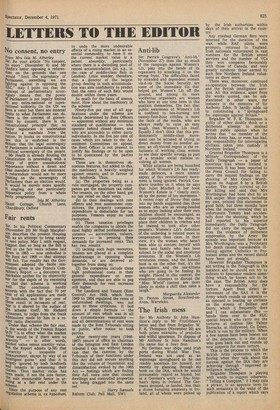Anti-lib
Sir: Patrick Cosgrave's ' Anti-lib ' (November 27) does like so much of the campaign against Women's Lib, play into the hands of its organisers by attacking it on the wrong front. The difficulties faced by stranded and dependent women yis-d-vis the Social Security are some of the immediate ills that helped get Women's Lib off the ground, and among its more vociferous organisers are women who have at one time been in this position themselves. The fact that public awareness of Women's Lib is confined to bra-burning and twenty-four-hour crèches is more the fault of the media, who are always ready to raise an easy laugh, than Women's Lib itself. Equally I don't think that this predominantly middle-class movement can be accused of trying to direct money from its needier sisters: an oft-voiced regret is the reluctance of working class women to see their specific wrongs as part of a broader social malaise involving all women.
While attacks are being launched for which Women's Lib has readymade defences, a more sinister aspect of this revolutionary movement is being ignored. Patrick Cosgrave touches on it when he says that Juliet Mitchell in her book Women's Estate is "clearly excited by the power of her movement." A recent copy of Shrew that came into my hands suggested that those women who are so wrong-headed as to enjoy looking after their own children should be encouraged, as their contribution to the state, to place their children in creches and be trained to look after other people's. Women's Lib's definition of the underdog is related more to temperament than class. In their view, it's the woman who hasn't been able to content herself with home and family who has been subject to the social and emotional pressures. If the Women's Lib revolution comes, and the hobnail boot is on the other foot, it's the jam-makers and the sex-kittens who are going to be feeling its weight. Placed in this context, the vindictive attempts to disrupt the " Miss World" contest are more likely to strike a chill than raise a laugh." Marguerite Alexander 24 Payton Street, Stratford-onAvon, Warwicks.










































 Previous page
Previous page